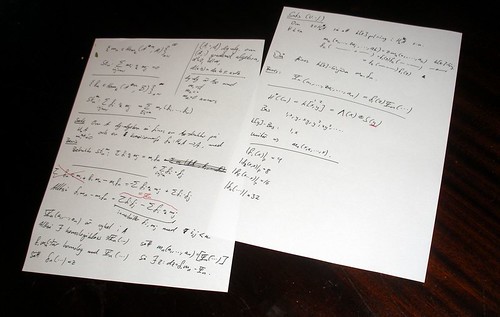Is This a Good Rental Investment? Part II: How to Run The Numbers
Cashflow is King!
 Are you considering becoming a landlord? And you've already checked out the neighborhood around the place you're considering buying? Then it's time to look at the numbers and figure out if this place is a good rental investment.
Are you considering becoming a landlord? And you've already checked out the neighborhood around the place you're considering buying? Then it's time to look at the numbers and figure out if this place is a good rental investment.
What Will Your Net Rental Income Look Like?
The number one number to calculate is your probable net rental income. If you assume that your property will never experience any capital appreciation (it should!), and you're going to have to get 100% of your value from the rental income (you won't), you'll be setting yourself up to exceed your expectations -- which is a good thing.
Net Rental Income = Gross Income - (Operating Costs + Debt Payments).
In this case, your operating costs include monthly costs like taxes, insurance, utilities, property management fees and so on, as well as annual or variable costs like repairs, vacant periods, and utility hookups. Debt payments generally refers to the mortgage payment you have to make on the property, assuming you didn't buy it outright.
Of course, to get this number, you have to have an idea of what your gross rental income will be, but we've covered that recently here. Get that number along with an estimate of your costs, and calculate your Net Rental Income first. If your result seems to be less than you consider 'worth your time', it's time to start looking at a different property.
Calculate the Cash-on-Cash Return
The next step is to multiply your Net Rental Income by 12 to determine your Annual Cashflow. (Don't worry about income tax; it's not important here.) Then, divide your Annual Cashflow by the total amount you're going to have to invest to get the property rented out -- not the cost of the mortgage, but just the out-of-pocket expenses. So for example if you purchase a property for $75,000 but you get $50,000 of that in the form of a mortgage, you only divide the Annual Cashflow by $25,000.
The result will generally be somewhere between .1 and .4 -- and you want to see a higher number. If the result is less than .2, it's probably best to look at another property, because you're looking at more than five years just to make your out-of-pocket expenses back. If it's more than .3, move forward -- but you're not done yet.
Determine Your Net Rental Yield
Your Net Rental Yield is (Net Rental Income *12)/Property Value. For example, if you have the aforementioned $75,000 home and your Net Rental Income is $650, your Net Rental Yield is 10.4%. In other words, your home will produce 10.4% of its own value each year -- paying itself off in a little less than 10 years. (This number is also called the "Capitalization Rate," because once you reach 100%, your investment is paid off and producing 'pure capital'.)
Note that the current Property Value is used, so as your property's value goes up (or down), the NRY can change with each passing year.
The higher the Net Rental Yield of a property, the better the opportunity for net positive cash flow it presents.
It's up to you to determine the NRY you're willing to accept -- many investors believe 8% is appropriate in the current market -- but being able to calculate the number for several different properties can give you an idea of which of them is the most likely to serve you well over the long run.
________________________________________________________
If you enjoyed our blog post,
connectwith us on the social networks below & subscribe to our blog!
“Referrals are Sending Someone You Care about, to Someone You Trust!”
So, forward this blog post to someone You Care About!
________________________________________________________
P:800-376-8610 x1 • RRPInfo@RoyalRoseProps.com • www.RoyalRoseProperties.com
| Topic | Replies | Likes | Views | Participants | Last Reply |
|---|---|---|---|---|---|
| NoWhoUR a lesson in authentic branding | 0 | 0 | 297 | ||
| Getting Ish Done | 0 | 0 | 452 | ||
| Get Better at Communicating NOW | 1 | 0 | 549 |



